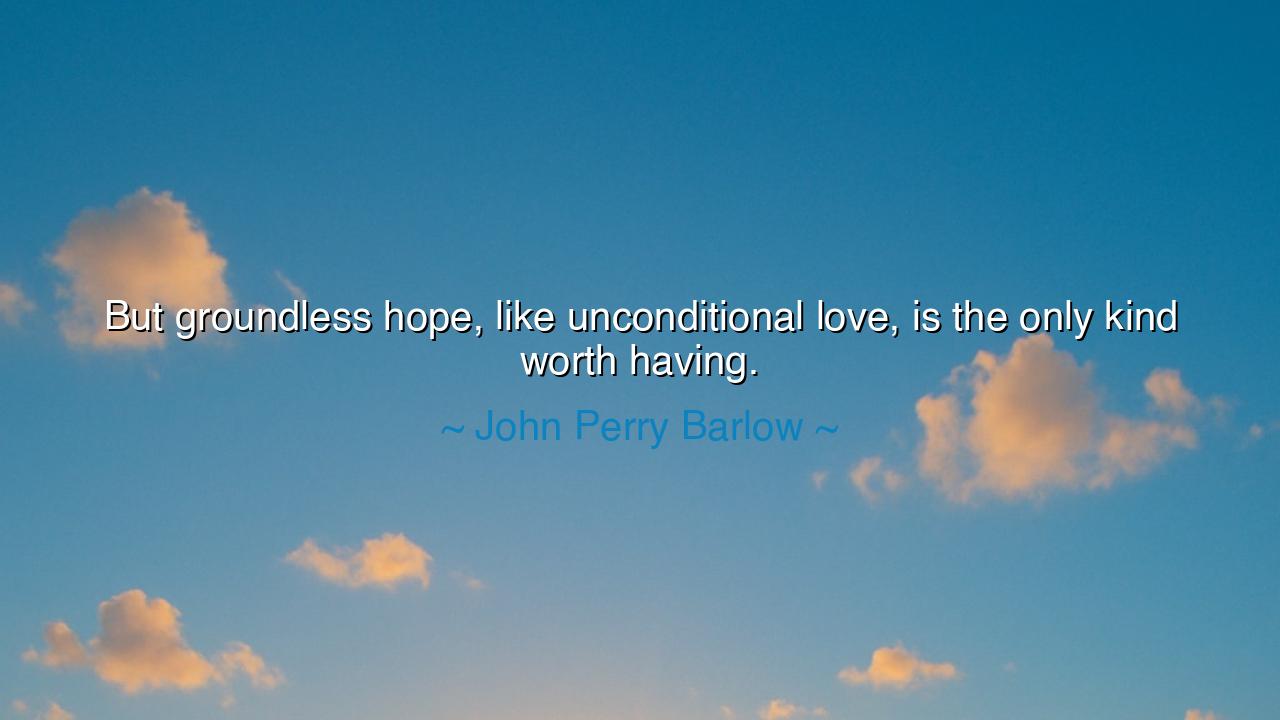
But groundless hope, like unconditional love, is the only kind






“But groundless hope, like unconditional love, is the only kind worth having.” Thus spoke John Perry Barlow, poet, philosopher, and dreamer of the digital dawn. His words shimmer like the morning star over a dark horizon—an anthem for all who persist when reason falters. In them lies a truth both daring and divine: that the only hope worth holding is the kind that defies reason, and the only love worth giving is that which asks for nothing in return. For the highest virtues of the human spirit—faith, love, and hope—are not bargains struck with the world, but acts of creation that spring from the soul itself.
Barlow, a lyricist for the Grateful Dead and a founding visionary of cyberspace, lived at the border between the known and the unknown. He saw humanity entering an age without maps, a frontier where faith in possibility was all that kept progress alive. To him, groundless hope was not naïveté, but courage—the willingness to trust in the unseen, to believe that what is good can still be born in a world that offers no guarantees. Such hope is not based on logic or evidence, but on the spirit’s refusal to yield. It is the same defiance that kept prophets preaching, lovers forgiving, and dreamers building civilizations out of dust.
The ancients, too, understood this sacred paradox. The Stoics taught that hope and despair are both illusions of the future, yet even they admired the man who acts with virtue though all outcomes seem lost. The Christians spoke of faith as “the substance of things hoped for, the evidence of things not seen.” And the Buddha himself, though teaching detachment, built his path upon the belief that enlightenment is possible for all beings. From age to age, the wisest have known: when logic ends, the soul must begin. To hope without cause is not folly—it is the heartbeat of creation itself.
Consider the life of Nelson Mandela, imprisoned for twenty-seven years in a cell no larger than a tomb. Each day, the world outside changed without him; each year, his cause seemed forgotten. Yet within that darkness, he held a groundless hope—a hope that his country could be free, that forgiveness could triumph over vengeance. When he emerged at last into the light, that hope had already remade him into the very instrument of its fulfillment. It was not reason that kept him alive; it was the same divine irrationality that births stars and poetry—the belief that goodness can prevail even when every sign says otherwise.
So too with unconditional love, its sister virtue. To love with conditions is to measure and trade; to love unconditionally is to transcend the self. It is to say, “I will give not because you deserve it, but because it is my nature to give.” Such love is the love of a mother for her child, of a teacher for his pupils, of one human for another even in their imperfection. It is the love that Christ showed upon the cross, that Gandhi practiced in peace, that countless nameless souls have embodied in silence. Barlow saw that hope and love share one essence: both are irrational, both are divine, and both are the forces that keep the world from collapsing into despair.
The meaning of this quote, then, is not a call to blind optimism, but to spiritual bravery. Groundless hope is not the denial of reality—it is the refusal to let despair define it. It is the quiet, stubborn belief that even in darkness, something good remains possible; that even if the world ends tomorrow, it is still worth planting the tree today. Such hope belongs not to those who expect reward, but to those who know that life itself is the miracle, and to love and hope within it is to participate in the divine act of creation.
Therefore, the lesson is this: dare to hope when there is no reason, and love when there is no promise. Do not wait for proof that the world deserves your faith; offer it freely, as the sun gives its light. When the future seems uncertain, create it with your belief. When others grow bitter, remain kind. When the world seems ending, build something beautiful still. This is what it means to live as a human being in full—to cast one’s heart into the void and trust that, somehow, the void will bloom.
And so, my listeners, remember these words as both comfort and command: “Groundless hope, like unconditional love, is the only kind worth having.” For reason can be broken, and promises can fail—but the heart that dares to hope without reason and love without limit is indestructible. It walks hand in hand with the eternal. It builds worlds where none existed. And when its body falls, its faith still burns in the hearts of those who come after, lighting the path of humanity toward what it was always meant to be: free, fearless, and divine.






AAdministratorAdministrator
Welcome, honored guests. Please leave a comment, we will respond soon